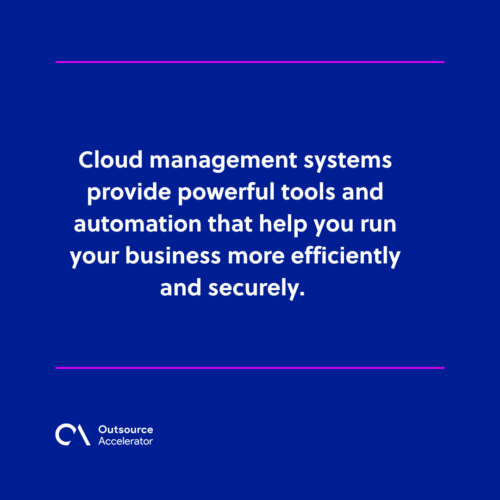A comprehensive introduction to cloud management

As technology continues to improve and evolve, businesses are always looking for ways to run more efficiently and effectively.
In today’s business environment, there is much shift from owning your data to hosting it on someone else’s platform.
Whether it’s storing files, sharing music or videos, collaborating with co-workers or customers, or saving money by doing your own IT, the cloud can help with many different things.
Letting a third party manage the data center can be a bit scary for many business owners. This is mainly because they don’t understand the benefits that come with it.
Cloud providers offer a flexible budget and quick setup time, so it doesn’t take much to see why cloud management is becoming more common among businesses.
With the emergence of cloud management, companies are considering this system to increase their business efficiency and cut operational costs.
This article will discuss cloud management’s benefits and functionalities for your business.
What is cloud management?
In a more straightforward definition, cloud management is managing data and applications in a cloud environment.
Usually, this would mean a company can manage its cloud infrastructure and software. It also provides services like storage, computing, and others for customers who have contracts with companies such as:
- Amazon Web Services (AWS)
- Google Cloud Platform (GCP)
- Microsoft Azure
Cloud management gathers information, analysis, decisions, and creative action in a cloud environment.
The benefits of cloud management for companies that use it include more efficient infrastructure, cost-effective management, and better ROI from IT investment.
It also provides features for monitoring, maintaining, and managing the infrastructure anywhere and at any time for technical efficiency and cost reduction.

Why is cloud management critical to an organization?
Many organizations today are shifting their focus to the cloud. Because of this, cloud management becomes vital to the business process aside from employees’ productivity and corporate engagement.
Cloud management brings many benefits to an organization, including the ability to manage and control workloads in various production environments.
Cloud computing services are revolutionizing the way an organization works. Firms no longer need to keep the information on a local server or pay a monthly fee.
Additionally, because of cloud management, more and more companies can now access all of their data from anywhere using a web connection.
Goals of cloud management
Cloud management is now a requirement for organizations that want to improve their efficiency, reduce costs and still be able to manage everything from one location.
One of the main goals of the cloud management system is to support a wide range of customers and target different workloads.
Cloud management does not expose all the organization’s information and functionality to an external entity but provides secure access to essential operations.
However, a cloud management system’s other objectives highly depend on the application’s nature and other business processes.
As such, it is necessary to define objectives because no companies can adopt cloud management systems in their business process if the goals are unclear.
Critical components of cloud management
To maintain a healthy and safe business in the cloud, firms must incorporate the vital elements of cloud management in their business process.
Here are some of the critical components of cloud management:
Simplification
Simplified cloud management systems are customized cloud services. These systems allow organizations to manage their infrastructure flexibly and cost-effectively through reduced overhead costs.
Additionally, a simplified cloud management system can help a firm to manage the entire cloud environment in its information technology network quickly and efficiently.
Multiple cloud ability
Multiple cloud ability aims to simplify IT access, allowing the deployment of applications and services from various providers.
One example of this cloud management component is social networks, where users can easily connect and share all kinds of information with people around the globe.
Good automation features
There are times when you have to deal with many tasks simultaneously, which require good cloud management automation.
Cloud management systems provide powerful tools and automation that help you run your business more efficiently and securely.

App support
Application support is one of the most critical components of cloud management. It increases the organizational system’s functionality and ease of use.
As a result, firms save time and money and have better people experience, which are crucial factors in any business’s success.
Cloud management challenges
All the issues, challenges, and opportunities of the cloud make it a highly relevant topic to IT professionals with responsibility for the security of their organization.
Some of the challenges you will encounter include the following:
- Managing private and public clouds
- Operating and configuring virtual machine sizes
- Controlling network traffic and;
- Working with third-party service providers
As such, there are other challenges in cloud management.
Performance management
Performance management is one of the most critical tasks in any business. Identifying areas of concern is vital while guiding how to solve these problems.
However, this can be a challenging task in cloud management because the system’s performance has to be constantly monitored.
Because there is constant monitoring, organizations need to be more agile and flexible to meet their obligations.
Costs
For companies that use cloud management more aggressively, the cost of managing software is high, especially if these companies refuse to change their applications for a lower price.
This means that if they remain using local systems, maintaining them becomes increasingly expensive and complex.
Cloud monitoring
Cloud monitoring is a challenging task for cloud service providers. Because of its complexity, the measures to manage cloud resources are generally inadequate and ineffective.
You need a good monitoring tool that provides regular security updates to ensure your application can run continuously through various threats and attacks.
Why should your organization adopt cloud management?
Cloud management helps you stay on top of your online security efforts efficiently. It allows you to keep track of trends and the best ways to establish a cloud-based environment.
You can devise strategies to detect cyber threats and avoid attacks by implementing a cloud management system.
When there are threats detected, cloud management lets you respond quickly and effectively, minimizing the damage caused by any breach.
More importantly, having a sound cloud management system will lead to better user adoption and more vital company productivity.
This technology is critical to big and small businesses, so you must consider implementing it beginning today.







 Independent
Independent




